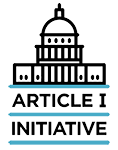The Federalist Society’s Article I Initiative is focused on the critical issue of why the modern Congress is not functioning as the most powerful branch as envisioned by the Framers. In order to help engage new thought and discussion about the proper role of the Congress, the Initiative is holding its fifth annual writing contest aimed at younger thinkers (participants must be 40 years old or younger).
The first-place winner will receive free registration, accommodations, and travel to the Federalist Society’s 2022 Student Symposium and a $7,000 cash prize. A runner-up $2,000 cash prize and a $1,000 honorable mention prize will also be awarded. Submissions are due by January 10, 2022.
To enter, click here.
This year’s topic is “Congress and the Power of the Purse: Lost to History?“
Under Article I of the Constitution, Congress’s first two enumerated powers are “to lay and collect Taxes” and “to borrow Money on the credit of the United States”; a separate provision requires that “No Money shall be drawn from the Treasury, but in Consequence of Appropriations made by Law.” These provisions invest Congress with comprehensive authority over federal revenues and expenditures—the “power of the purse”—and over the balance of taxing, borrowing, and spending that is now called fiscal policy.
Congress has allowed these powers to atrophy over the past half-century:
- The borrowing power has been delegated to the Department of the Treasury without effective limits on total public debt.
- Most federal spending is now determined by automatic “entitlement” formulas rather than congressional appropriations—and appropriations for other spending have become a charade, as Congress has ignored its own appropriating procedures (established by the Congressional Budget Act of 1974) and instead set annual spending through emergency “continuing resolutions.”
- Most federal revenues are still raised through taxes established by Congress, but the executive branch now “lays and collects” hundreds of billions of dollars of administrative fees and enforcement fines each year; as a result, many programs and even entire agencies are now financially self-sufficient and appropriations-free.
Some observers believe that these developments are an important cause of the growth of deficit spending and federal debt, of the decline in effective congressional oversight of the executive branch, and of the emergence of “the administrative state.”
What might have caused Congress to relinquish its critical financial powers? Were the growth of government and political polarization the causes or the effects of these developments? Do realistic means or appropriate incentives exist for Congress to reassert its power of the purse? Do the courts have a feasible role to play in enforcing constitutional discipline in the financial arena, akin to a revived nondelegation doctrine in regulatory law?
Click here for the entry form with the full list of rules.

